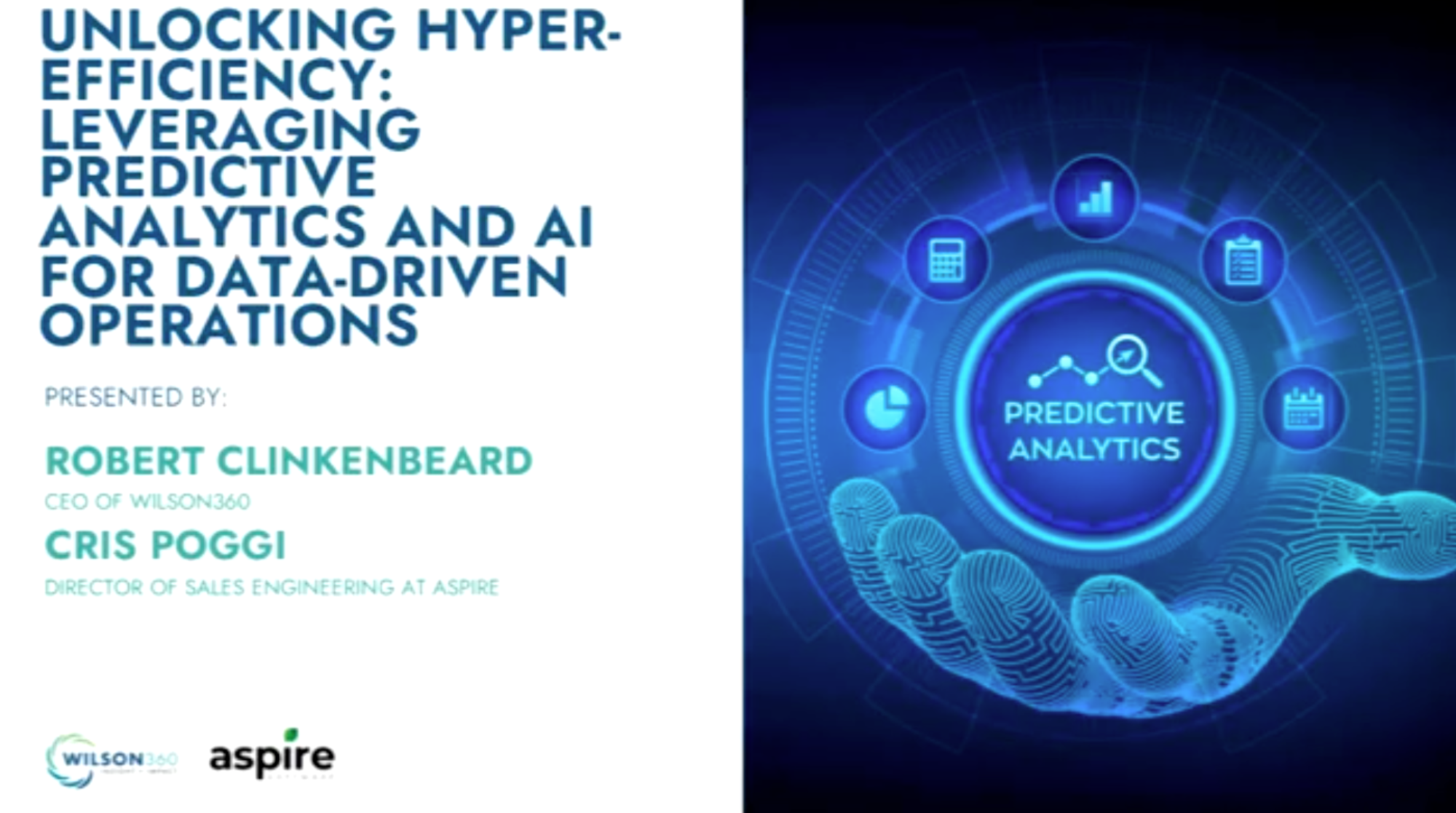Leveraging technology to standardize workflows in commercial cleaning and building services improves efficiency, scales business, and drives growth.
In a recent Aspire webinar, Steven Harper, President and CEO of Spectrum Building Services of America Inc., and Dryden Dennis, Client Success Manager with Aspire Software, discuss how improving organizational processes sets the stage for scalability and business growth.
“If you become a process-driven organization, you’re going to outperform your peers,” Harper says. “If you can consistently execute day in and day out, customers are willing to pay for that, and they’ll stick with you.”
Scale business to overcome industry challenges

Building a scalable business with efficient workflows enables cleaning companies to manage industry challenges.
Current challenges in the commercial cleaning industry include:
Labor shortages and high turnover
Rising operational costs
Competitive pressure from national players
“If you really want to do a good job, you have to have the overhead, but then to afford the overhead and be competitive, you have to have a lot of business,” Harper says. “It becomes this double-edged sword.”

Setting up a business to scale increases its ability to stay competitive and ensures consistent quality service.
“It allows you to build a system that grows your business,” says Harper, who shares that Spectrum Building Services of America is set to grow by 300% within 120 days, primarily due to current satisfied customers wanting the company to take on more work. “You want to make sure the thing that got you there, the thing that you stand for, you’re actually able to do when you get more customers.”
Create a plan for effective scalability
Effective scaling requires a plan and a team buy-in so everyone works toward the same goal.
“Having people buy into the ‘why’ was really key to buying into the idea of growth,” Harper says. “We started with ‘why,’ which is because we want to create good job opportunities, we want to create salary growth for our team. We want to be able to have things like bonuses, 401(k)s, and healthcare plans.”
Standardized processes and technology integration enable businesses to scale effectively by streamlining operations, centralizing data, and working more efficiently.

“You start looking at all your processes because you’ve got to become more efficient, and you’ve got to reduce costs,” Harper says. “And more importantly, you have to have stability and quality as you grow. I’ve seen and heard the horror stories of businesses growing and the whole thing just imploding. And we knew with certainty that we didn’t want that.”
Integrated technology reduces data entry, eliminates redundancies, and improves efficiency, so businesses don’t need to increase administrative staff. Aspire’s complete software system aligns processes with best practices for successful results.
“People try to make the software aligned to the way they do work, and that’s exactly the wrong way to do it,” Harper explains. “You’ve got to morph your processes around the best practice of the software. If you go into it with that mindset, that we’re going to change as a company, that we’re going to make sure we’re doing things in a way that is best practice, that’s going to make the difference.”
Develop standardized workflows and processes

Technology empowers cleaning business owners to reduce working hours, operate with less friction, and improve business management.
Steps to standardizing processes include:
Map out core processes
Determine North Star and process metrics
Develop playbooks
“We’ve always been a fairly process-oriented company,” says Harper, citing his background in electrical engineering, finance, and business management.
Identifying metrics enables businesses to measure overall performance. “North Star” metrics, which refer to company-wide goals, enable companies to measure and improve critical processes.
Playbooks detailing tasks for every job simplify training and hold employees accountable.
“We had to take it to another level and develop playbooks so we could have interchangeability if someone’s not around or if someone new comes aboard,” Harper says. “What we found is that standardizing our processes and having standard playbooks was a huge thing for us.”
Leverage technology with real-time data
Effective scaling requires technology that automates meaningful, real-time data. A tech stack combining an integrated Enterprise Resource System (ERP), a Human Resource Information System (HRIS), and financial management provides the necessary tools to scale business.

“In order to really do what we wanted to do, the quality of information was the most important thing,” says Harper, explaining that, with the company’s previous software system, they couldn’t access real-time data, such as budget versus actuals.
The company switched to Aspire for its ERP and customer service management because it wanted a best-in-class application with the greatest interoperability and integrations.
“It enables us to streamline, automate, measure, and improve our operations,” Harper says.
For HRIS, the company uses Inova, a robust payroll, human resources, and benefits management system that fully integrates with Aspire. It allows the company to onboard remotely and efficiently as it scales in multiple states. It also enables the company to streamline performance-based pay, which supports its workforce and improves employee retention.
“We did it manually before, and it was a lot of work,” Harper says. “Now the HRIS makes it easier. Doing it for a few hundred employees is different from doing it for a thousand or a few thousand.”
The company uses QuickBooks for financial management, which also integrates with Aspire.
Track metrics for performance measurement

Aspire’s customizable dashboards enable cleaning businesses to easily track key performance indicators and metrics to gauge performance and ensure continuous improvement.
Spectrum Building Services of America uses Aspire to track the following key metrics.
North Star metrics include:
Net promoter score
Customer satisfaction score
Employee retention rate
Recurring revenue growth rate
Gross profit margin
Net income percentage
Sales and marketing metrics include:
Proposal volume
Sales volume
Close rate
Customer acquisition costs
Operations metrics include:
Work ticket management
Labor hours budget vs. actual
Overtime percentages
1:1 meetings completed percentages
Service complaints received
Administrative metrics include:
A/R balance over 30 days
A/P timeliness
Payroll accuracy
Month-end close timeliness
Training completion rate
Every leader at Spectrum Building Services of America uses their own customizable dashboard in Aspire to track specific metrics. Aspire shows an overall real-time snapshot but also provides the ability to drill down into individual performance metrics.
“This was one of the biggest selling points for my team,” Harper says. “When they saw the dashboard, they’re like, ‘You mean we can get this?’”

Real-time metrics enable the company to track every facet of operations and tie bonuses to metric achievements.
“No one is off the hook,” Harper says. “Every employee in our company has metrics for which they’re accountable.”
Improve client satisfaction with operations software
Spectrum Building Services of America improves client satisfaction by maintaining a high level of service and providing clients with timely service completion reports.
The company creates daily work tickets in Aspire, informing employees of the day's specifications. Before employees clock out, they must finish everything on the checklist.
Aspire’s native features enable the company to efficiently monitor employee performance, track results, and improve client communication. The company performs periodic work for one client that involves window washing, carpet cleaning, and floor stripping and waxing.
“Every time we do something, we send out an email with pictures to the customer for proof of service,” Harper says. “They’re just blown away by it. We do what we say we’re going to and prove that we’re doing what we say.”
The company prioritizes client communication and commits to resolving service issues the same day.
“People will forgive you for making mistakes, or they’ll forgive things happening, but what they won’t forgive is feeling like you don’t care or you’re not following up or you’re not responsive,” Harper says. “That’s where they really lose faith in you.”
Aspire provides the tools to centralize data and increase visibility so cleaning company teams can quickly resolve issues and satisfy customers.
“When you start having hundreds and thousands of locations, it becomes a lot harder to track everything that’s going on,” Harper says. “If a customer reaches out to anyone in our office, we have access and visibility to every issue that’s been going on with them from time immemorial. That’s the whole point. If someone’s working on it, we all have access to the same information.”
Aspire’s built-in workflows and processes empower Spectrum Building Services of America to deliver consistent service, improve client satisfaction, and scale business for rapid growth.
“It just makes all the difference in the world,” Harper says. “They realize that they can't replace us with a guy with a mop in a bucket. They’re dealing with a professional company.”
To learn more about developing commercial cleaning business workflows for scalability and growth, view the full webinar on demand.










